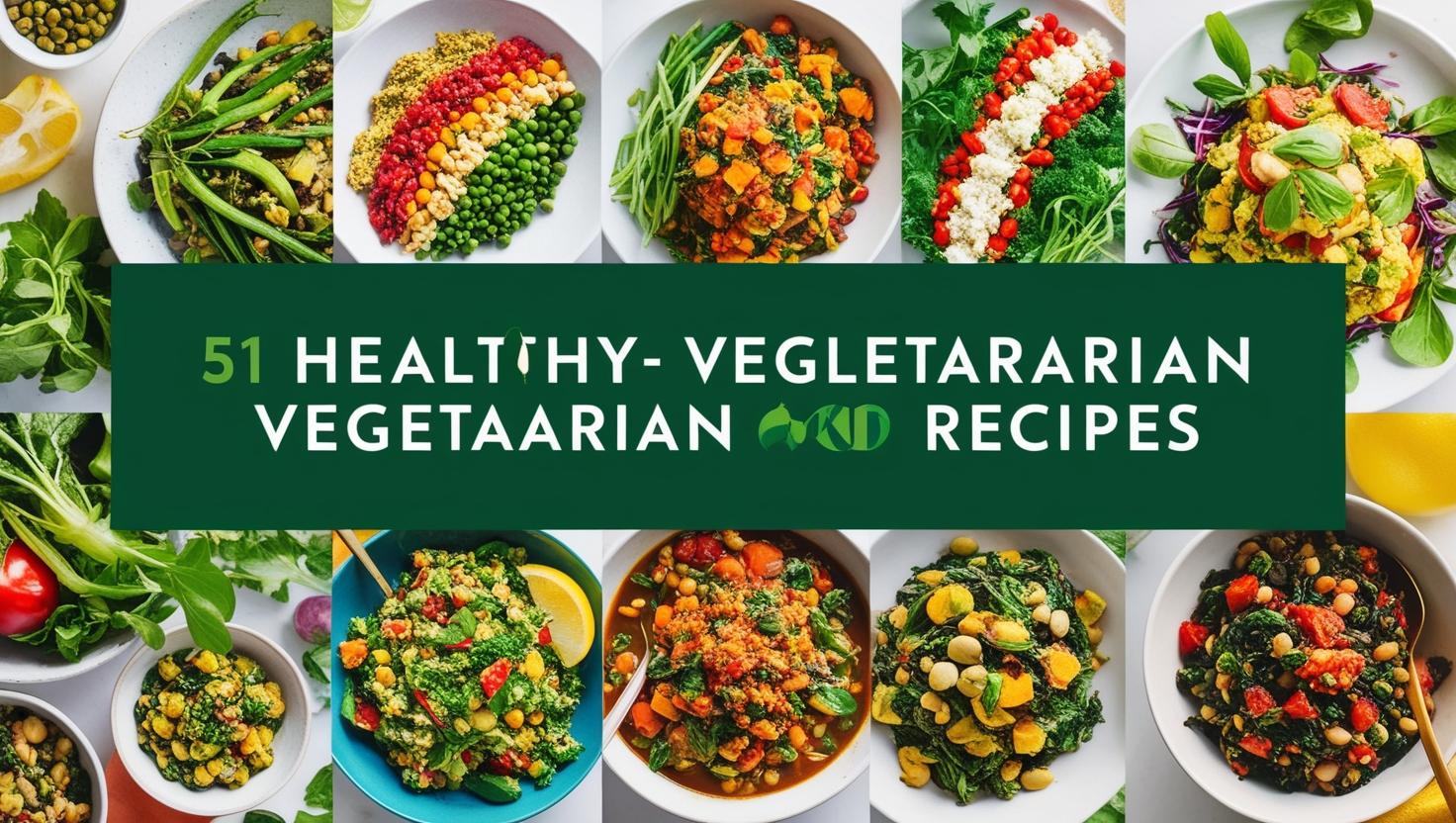Meta Description: Discover healthy recipes for vegetarians that combine incredible flavor and essential nutrition—all without any meat.
Introduction
In a world where fast food and convenience meals dominate, the demand for nutritious, flavorful, and easy-to-prepare vegetarian options has skyrocketed. Whether you’re a seasoned vegetarian, considering reducing your meat intake, or just curious about plant-based eating, you’ve likely wondered: Can vegetarian meals truly be satisfying and delicious without sacrificing health or taste?
The answer is a resounding yes—and this article will prove it to you. Today, we’re diving deep into the world of healthy recipes for vegetarians, revealing how meatless dishes can still pack a punch in flavor, texture, and nutritional value. With the right ingredients and techniques, vegetarian meals can turn into gourmet experiences you’ll crave over and over again. Intrigued? You should be. Let’s explore a flavorful journey into plant-powered nutrition that delights your taste buds and fuels your body.
Why Choose Vegetarianism?
Choosing a vegetarian lifestyle isn’t just about avoiding meat—it’s a conscious decision to prioritize health, sustainability, and often compassion. Studies have shown that well-planned vegetarian diets offer numerous health benefits, including:
- Reduced risk of heart disease and high blood pressure
- Better weight management
- Lower cholesterol levels
- Improved digestion and gut health
In addition, plant-based diets are more sustainable and eco-friendly, reducing your carbon footprint while promoting animal welfare. It’s a powerful lifestyle shift—and it starts on your plate.
Core Components of a Balanced Vegetarian Diet
A vegetarian diet must be nutritionally balanced to ensure your body gets all the essential nutrients. Here’s what your plate should ideally include:
- Plant-based proteins: legumes, lentils, tofu, tempeh, and quinoa
- Healthy fats: avocado, nuts, seeds, olive oil
- Whole grains: brown rice, oats, barley, whole wheat pasta
- Colorful vegetables: bell peppers, kale, spinach, carrots, broccoli
- Fruits: berries, bananas, apples, oranges, and seasonal varieties
- Calcium sources: fortified plant milks, leafy greens, sesame seeds
When combined strategically, these ingredients form the foundation of delicious and nutritious healthy recipes for vegetarians that support energy, vitality, and long-term health.
Irresistible Healthy Vegetarian Recipes to Try Today
1. Quinoa & Chickpea Buddha Bowl
Packed with protein and fiber, this colorful bowl is a staple of the vegetarian diet.
Ingredients:
- 1 cup cooked quinoa
- ½ cup roasted chickpeas
- 1 cup steamed broccoli
- ½ avocado, sliced
- 1 grated carrot
- 2 tbsp tahini dressing
Directions:
Layer all ingredients in a bowl. Drizzle with tahini dressing and a squeeze of lemon. Enjoy the vibrant flavors and powerful nutrients in every bite.
Why it works: This recipe hits all macronutrient groups—fiber, healthy fats, protein—and leaves you full and satisfied.
2. Creamy Sweet Potato & Lentil Curry
This rich, warming curry is the ultimate comfort food—with a nutrient-dense twist.
Ingredients:
- 1 cup red lentils
- 1 chopped sweet potato
- 1 can coconut milk
- 1 tbsp curry powder
- 2 cups vegetable broth
- Fresh cilantro for garnish
Directions:
Sauté sweet potato in a pot with curry powder. Add lentils, broth, and coconut milk. Simmer for 20–25 minutes until creamy. Top with cilantro and serve with brown rice or naan.
Health highlight: Lentils provide iron and protein, while sweet potatoes offer vitamin A and slow-burning carbs.
3. Zucchini Noodles with Avocado Pesto
A fresh, low-carb take on pasta night!
Ingredients:
- 2 zucchinis (spiralized)
- 1 ripe avocado
- 1 cup fresh basil
- 1 clove garlic
- 2 tbsp olive oil
- Juice of 1 lemon
Directions:
Blend avocado, basil, garlic, lemon juice, and olive oil into a creamy pesto. Toss with zucchini noodles and serve cold or lightly warmed.
Guilt-free bonus: This dish is raw, refreshing, and brimming with antioxidants.
Pro Tips to Maximize Nutrition
Healthy recipes for vegetarians can be optimized for maximum nutritional benefit with these smart strategies:
- Soak beans and legumes before cooking to improve digestibility
- Use herbs and spices like turmeric, cumin, and cinnamon for flavor and health benefits
- Don’t skip B12—take a supplement or choose fortified foods
- Pair iron-rich foods with vitamin C (like citrus or tomatoes) to boost absorption
- Batch cook meals to save time and reduce daily meal stress
With a little planning, your vegetarian meals can be more nutrient-dense than any traditional diet.
Common Mistakes to Avoid in Vegetarian Cooking
While adopting a vegetarian lifestyle is exciting, here are a few pitfalls to avoid:
- Overrelying on processed meat substitutes: Many are high in sodium and preservatives
- Ignoring protein intake: Always include a plant protein source in your meals
- Lack of variety: Rotate your veggies, grains, and legumes to avoid nutritional gaps
- Not reading labels: Some foods marked “plant-based” may still contain hidden animal by-products
Avoid these mistakes, and your path to vibrant health becomes clearer, tastier, and more rewarding.
Conclusion
The world of healthy recipes for vegetarians is diverse, delicious, and endlessly rewarding. Far from being boring or restrictive, a well-crafted vegetarian diet opens doors to culinary creativity, deeper health, and sustainable living. With dishes like quinoa bowls, lentil curries, and avocado pesto noodles, you can fuel your body and satisfy your soul—all while contributing positively to the planet.
Now’s the perfect time to start—or elevate—your journey into plant-based eating. So, why wait? Dive into these recipes, explore new ingredients, and let your kitchen be the gateway to a healthier, more flavorful life.
Ready to revolutionize your meals? Try just one of these recipes today and feel the difference—your taste buds and your body will thank you.
